The Economic Gulf
The Disparity between eurozone Countries
The scale of Kohl and Mitterand's ambition was magnificent, or perhaps foolhardy. Europe was a place of diverse cultures
and economies. Even its two leaders came from very different backgrounds.
David Marsh "you can hardly imagine two more unlikely people. Firstly, they had no common language. They could only conversed
through interpreters. Also, they understood nothing of economics. They were totally disdainful of economists and they call those
people technicians."
The economies of Europe were as divergent as their cultures. In 1973, when Ireland joined the common market, it was a farming
economy, whose income per head 40% below the average for Europe.
eurozone Disparity
Mick Wallace "Dublin, as the capital city of a sovereign state, has always had a cosmopolitan feel. Now that the country has
entered Europe, the international character is even more pronounced. It was obviously a much more backward place than it is now.
There was less money, how much what was around varied. I mean, things went up and down. The European market opened us up to the
greater world, so we started looking a little bit beyond ourselves and the English market. It was a sort of the beginning of
the Irish opening up."
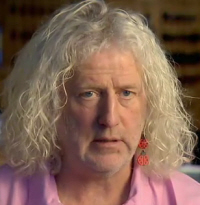
Mick Wallace - Politician
The great diversity of Europe includes differing attitudes to how wealth should be created.
Mick Wallace "We're kind of gamblers at heart. Would like to gamble, right? That's reflected in the huge interest in
horse racing here. But even though we are conservative in many ways, we don't mind taking a risk, you know. And when the
opportunity came along, and the cheap money arrived, let's have it. We said, I suppose, though take a chance with it."
Other poorer parts of Europe – Portugal, Greece, Spain – joined in the great experiment. And right from the very
beginning, it was always volatile Italy, with its rich North, and poor South and love of the "Dolce Vita".
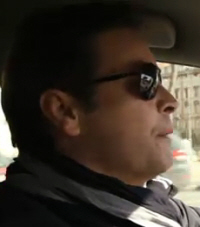
Roberto Masula, Taxi Driver
If you want to find out what's going on, ask the taxi driver. In Rome, I met Roberto Masulo. Roberto, why did you become
a taxi driver?
Roberto "it's a job I've always loved, handed down from father to son. My grandfather was a taxi driver and I'm the
son of a taxi driver."
Italy is notorious for the massive black economy, business nepotism and restrictive working practices that limit access
to many trades and professions.
Roberto "In Italy, some people have been used to living beyond their means. Sometimes we are a little bit too good at
bending the rules. We also feel that in some countries in Europe, there is more rigour in the payment of taxes, respecting
the rules. Perhaps in Italy in the last few years, we haven't always been so good at playing by the rules."
The problem with the good life, Italian style, is that it wasn't being earned properly. Italy's private sector grew
too slowly and the public sector was weighed down by massive debts.
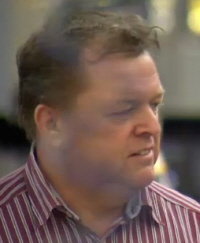
Horst Schuler
It's all been so different in Germany. After the war in the democratic West there was a national mission to rebuild
its industrial might on the values of thrift and hard work, through manufacturing and exports.
Nowhere is this story of recovery and prosperity more true than in Swabia in south-west Germany, home to Mercedes,
Porsche, Bosch and Kärcher.
Kärcher is a world leader in cleaning systems where Horst Schuler, a shift supervisor, keeps it all running like clockwork.
Horst "I've been working for Kärcher since 1978 and I love it today as much as the day I began."
Like so many German companies, Kärcher's success is built on long-term investment and financial prudence.
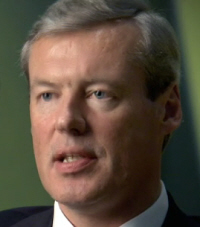
Hartmut Jenner
Hartmut Jenner, CEO - Kärcher "It's family driven. This means family owned. A lot of companies are family owned in
this area. This, of course, has a very stable shareholder base. These are all hours usually because most of the
shareholders are very modest. They reinvest most of the money in the company. This, of course, is the base for
the future. We're not paying dividends and taking out money from the company."
And what works for Swabian businesses works for Swabian households too.
Horst "The Swabian hausfrau make sure that she doesn't spend more money than is in the pot, just like Kärcher does.
The Swabians, and I am one of them, begin by saving their money. Only when they think they can afford something do
they actually buy it."
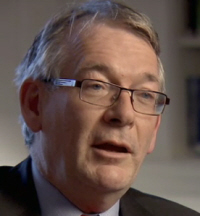
David Marsh
Agricultural Ireland, black economy Italy, industrial Germany – monetary union would harness together wildly different
cultures and economies. It needed a great shock to persuade them to abandon their national currencies.
The end of communism brought down the Berlin wall and the face of Europe was about to change for ever. But a unified
Germany would be an even stronger Germany. When it became clear that the momentum towards German unification was
unstoppable, the French Pres François Mitterrand, needed a way of constraining German power.
David Marsh "Mitterrand knew that the Germans were going to unify. Few knew there wasn't anything in this world that would
stop the Germans from unifying. The deal that was done was that the Germans, once unified, would then do everything they could
to embark towards a single currency."
For the French, monetary union was as much about politics, about the balance of power within Europe, as about
economics. The idea was to strengthen the institutions of the European Union, relative to member countries, so that
the growing power of Germany could be held in check.




